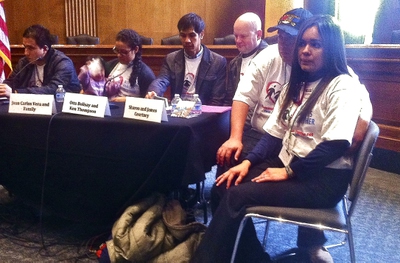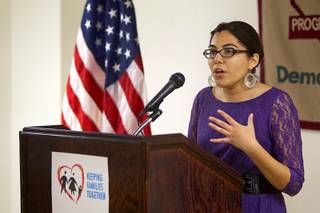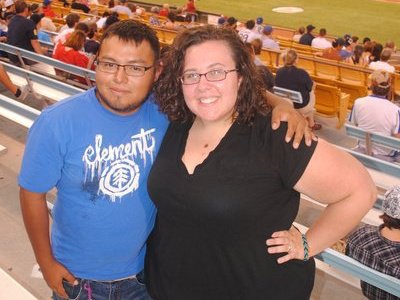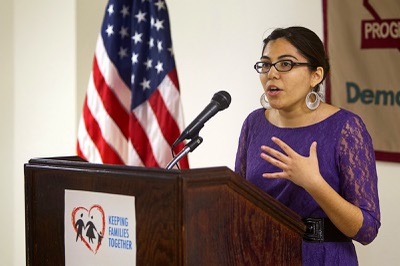Sunday, July 7, 2013 | 2 a.m.
For more
Immigration is, in many ways, a game of numbers.
There are numbers that define border security: How many troops will be deployed (20,000), how much fence will be built (700 miles), and how much all that will cost (almost $50 billion).
There are the numbers that affect the labor market: The number of visas that will be available, the number of years and fees it will take to get them, and let’s not forget the national unemployment rate, which will affect how many feel about the new immigrants.
But the most famous number is 11 million — the estimated number of immigrants living in the country illegally whose status the Senate immigration bill seeks to legitimize.
“Bring them out of the shadows” has been a rallying cry for many proponents of the comprehensive approach.
So as the Senate debated immigration over the past month, that’s what Sen. Harry Reid did.
He couldn’t get to all 11 million, of course. In lieu of such a parade, Reid selected eight Nevadans' stories to highlight — one per day, a few days per week — in his floor speeches on immigration reform.
They found him — or he found them — through letters, news articles and personal connections.
Their stories include those of a nurse, a military wife, a construction worker and a student. Their stories begin in countries from Mexico to the Philippines. They arrived in the United States by plane, swimming across rivers and riding on the shoulders of parents who walked across the border.
The legislation that would give them a pathway to legal status passed the Senate last month in a 68-32 vote. It now heads to the House of Representatives, where lawmakers are busy working on their own immigration bills. Speaker John Boehner has declared the Senate's version of the bill dead on arrival.
As the debate continues, here is a look at the stories of the immigrants featured on the Senate floor.
Anna Ledesma

Anna Ledesma came to United States with her family when she was 7 years old from the Philippines and stayed in the country after the visa tied to her father's work permit expired, eventually graduating from the College of Southern Nevada with a nursing degree. Anna, who is currently waiting for her own work permit, was photographed at the College of Southern Nevada Charleston campus on Thursday, May 23, 2013.
Anna Ledesma will be familiar to Las Vegas Sun audiences.
The 23-year-old nursing student at the College of Southern Nevada came to the United States from the Philippines when she was 7 years old, graduated at the top of her Centennial High School class and has been recognized for her artistic talent.
Reid quoted a Sun profile of Ledesma and other non-Hispanic immigrants in his first day of floor speeches on immigration, noting how Ledesma would try to tell herself that because she was working so hard to become a nurse, “they’re not going to deport me” — but never quite believed it.
“Like Anna, the Dreamers are talented, patriotic young men and women who want to defend our nation in the military, get a college education and work hard to help their communities and our country,” Reid said, noting that because of last year’s Deferred Action for Childhood Arrivals program, Ledesma could now believe in her mantra: “They’re not going to deport me.”
Alfredo Casteneda
Casteneda, 23, is another beneficiary of last year’s DACA rule. He was brought to the U.S. from Mexico illegally when he was 2 years old, “perched on his father’s shoulders,” Reid said, recalling a letter Casteneda’s father had sent him recounting his son’s story.
He left a shack of sticks and mud bricks in Mexico to come to the U.S., and “appreciates the privileges that come with life in America,” Reid said. “But he is also conscious of the opportunities available only to U.S. citizens — opportunities that aren’t available to him.”
Those opportunities include things as mundane as a library card, a summer job and a chance to apply to the colleges of his choice.
Instead, he volunteered in a hospital, got involved in politics and pursued an associates’ degree in business administration.
“Thanks to a directive issued last year by President Obama, Alfredo and 800,000 Dreamers like him won’t be deported and will be able to work and drive legally,” Reid said. “Alfredo has already applied for several jobs. He has even gotten a few interviews.”
Castaneda actually landed a job at PetSmart in Carson City, where he recently moved from Las Vegas. He hopes to save his money, transfer credits and complete his business degree soon.
Sharon Courtney

Sharon Courtney, right, sits next to her husband James listening to other undocumented immigrants share their personal stories. The Las Vegas couple came to Capitol Hill for an immigration rally at the Dirksen Senate Office Building to testify about their experience living with the threat of deportation looming over Sharon, March 13, 2013.
James Courtney was in the military for 15 years. He went to Iraq three times, was wounded and suffered a brain injury that caused him to take an early medical retirement.
Sharon Courtney is the mother of his three sons, his caretaker and wife of 13 years. She is also an immigrant in the country illegally, having come here as a teenager.
Courtney is too old, by just a few years, for the DACA program that would stay her deportation status and allow her a work permit.
“She has lived with the fear that she, on any given day, would be deported back to Mexico and her family would be torn apart,” Reid said of the Courtneys on the Senate floor. “When I heard James and Sharon’s story, I was recommitted to doing something to help them. And I did.”
With Reid’s intervention, Sharon’s deportation order was deferred — meaning there is no immediate danger she will be deported.
“While I was happy to help James and Sharon, it is unfortunate that they needed any help in the first place,” Reid said. “No veteran of the U.S. military should have to fight to keep his wife, the caretaker of his children, by his side.”
Genaro
Even with White House policies formalizing deferral orders in place and immigration reform on its way through Congress, the idea of stepping fully out of the shadows is still too daunting for some immigrants lacking the proper documents.
That is the case with Roxana, a U.S. citizen descended from Cuban immigrants, and Genaro, the Mexican immigrant who came to the United States illegally 15 years ago, and married Roxana in 2003.
“He left Mexico for the same reasons Roxana’s parents left Cuba — to try, to try really hard to build a better life,” Reid said.
Genaro worked odd jobs at odd hours for unsteady money — “a few dollars a day, to be honest,” Reid said. In Nevada, there was work in construction — before the economic crash, at least — and life was more stable.
But his status has never enjoyed such stability — even though Roxana and Genaro applied to change his immigration status soon after they wed.
“They have lived in limbo now for 10 years,” Reid said. “He worries every day of being deported.”
When Roxana and Genaro wrote to Reid, they stressed that they paid their taxes and weren’t looking for government benefits.
“We have friends and family here whom we love and love us,” Reid quoted their letter. “Yet (we) still feel like (we’re) not wanted.”
“Genaro is one of 11 million people living in America without proper documentation,” Reid said. “Regardless of how they got here or why they lack the proper documents, these 11 million people play a crucial part in our economy and a vital role in our communities. And they need a pathway to get right with the law.”
Blanca Gamez
Blanca Gamez is a familiar face in the Las Vegas immigration scene — she’s an immigration organizer for AFL-CIO, a volunteer at Hermandad Mexicana and one of the more active and outspoken Dreamers in Nevada.
Having come to the U.S. when she was 7 months old, she has no memory of Mexico. And she had no idea she was here illegally until she turned 16 — and discovered she couldn’t get her driver’s license.
“Blanca’s parents told her: ‘You need nine numbers,’” Reid said, recalling the story. “That refers to a Social Security number, which she did not have … which American citizens take for granted.”
Gamez recently qualified for deferred action status under the new government policy instituted last year, and plans to become a lawyer.
“They can now drive, they can work and they can get the nine numbers that unlock a successful future,” Reid said. “But Blanca’s future — and the future of 800,000 young Dreamers — will remain uncertain until Congress passes commonsense immigration reform. President Obama’s directive is only a temporary solution.”
Maria and Jorge Espinoza
Maria and Jorge Espinoza had a close call a few years ago. Immigration officials came to their door at 6 a.m. They put Jorge in handcuffs. And for a month, he spent time in a detention center — immigration’s jail.
“He was not a criminal. He works hard, pays his taxes and he is a good father and a good husband,” Reid said. “But Jorge is in the country without the proper immigration paperwork.”
Maria, also an undocumented immigrant from Mexico who also had a deportation order against her, managed to avoid the same arrest because someone had to stay home to take care of their teenage daughter, who is a U.S. citizen.
“Maria and Jorge were basically able to secure a stay of deportation, but they live with the fear that they will be torn away from their family and deported to a country they have not set foot in in 25 years,” Reid said.
The couple live in Las Vegas and have two daughters, a son and an infant grandson and countless friends and family. In Mexico, Reid said, they have only one really old relative, and know no one else — the result of having been in the U.S. for 25 years.
The Espinozas’ relatives, including their children, all have legal status in the United States. But that is part of what makes deportation seem so devastating.
“When you lose your mother or your father, you are an orphan. When you lose your husband, you are a widow,” Reid quoted Maria Espinoza as saying. “What do they call it when you lose a child, when you are separated from a child? There is no name for that.”
“It is crucial that Congress pass this bipartisan legislation to protect and preserve families,” Reid said. “We need to do it right now…it is personal to Maria and Jorge. It is personal to 11 million other undocumented immigrants and tens of millions of their U.S. citizen relatives, whose eyes are turned toward Washington.”
Astrid Silva
When Reid talks about immigration reform, he always reminds that it is a personal matter. And when he gets personal about immigration reform, he always returns to two individuals: His father-in-law, Israel Goldfarb, and his favorite undocumented immigrant friend, Astrid Silva.
“Astrid doesn’t remember Mexico, the country where she was born. But she does remember the day she left it behind,” Reid said in a floor speech just prior to the Senate’s final immigration vote. He recalled how a 4-year-old Silva had come to the U.S. in a frilly dress and patent leather shoes, crying because she was told she could only take her baptism cross and a doll for the trip across the Rio Grande.
Silva missed out on travel, driving and the chance to go to school out of state because of her status. But when she had to miss her grandmother’s funeral in Mexico, for fear of being caught by the authorities, she went from being an immigrant in the shadows to an activist out in the open.
“It was time to come out of the shadows and share her story,” Reid said. “So she spoke up. She told her story. And she gave me the first of many heartfelt letters, cards and notes.
“I have appreciated every one,” Reid said. “They are a reminder of what is at stake in this debate — a debate that involves our neighbors, friends and relatives.”




Join the Discussion:
Check this out for a full explanation of our conversion to the LiveFyre commenting system and instructions on how to sign up for an account.
Full comments policy